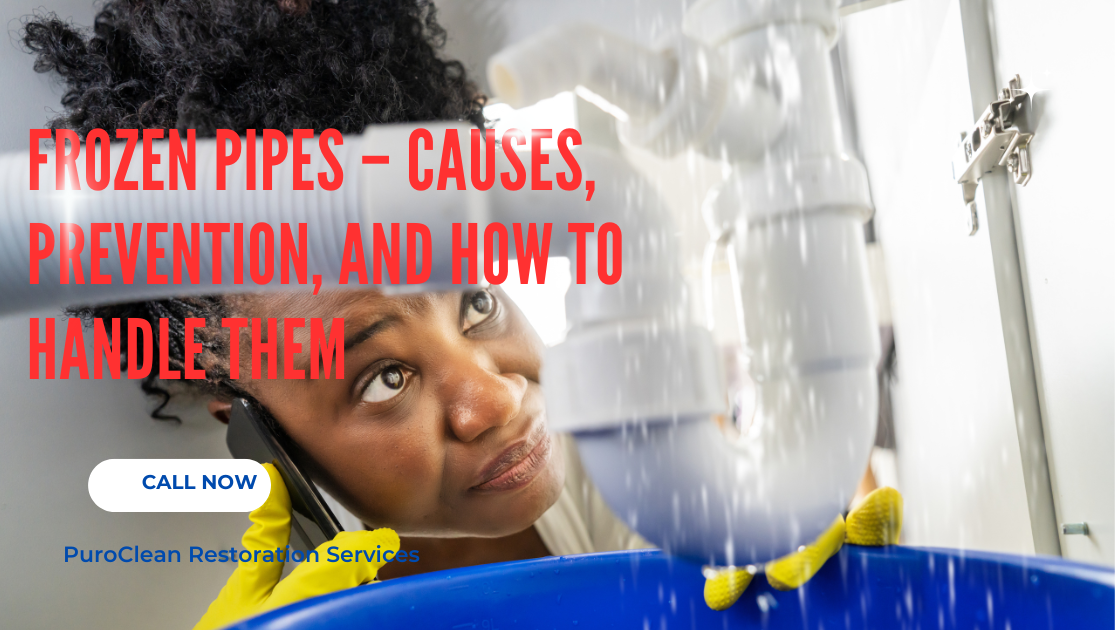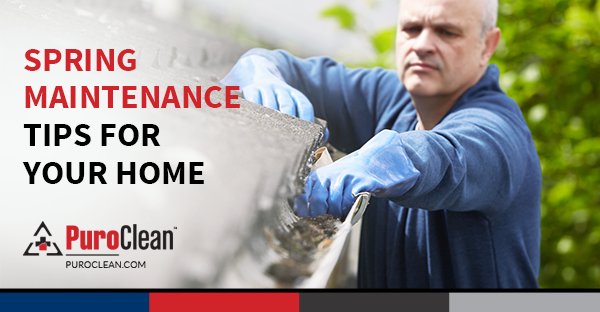Frozen Pipes – Causes, Prevention, and How to Handle Them
Table of Contents

Winter in Michigan can be brutal, and one of the most common issues homeowners face during the colder months is frozen pipes. Frozen pipes are more than just an inconvenience—they can lead to costly water damage and even burst pipes if not addressed promptly. In this blog post, we’ll explore the causes of frozen pipes, how to prevent them, and what to do if you find yourself dealing with this winter nightmare.
What Causes Frozen Pipes?
Frozen pipes occur when water inside your plumbing system freezes due to extremely low temperatures. When water freezes, it expands, which can put immense pressure on your pipes. This pressure can cause cracks or even burst pipes, leading to significant water damage.
Common Causes of Frozen Pipes
- Lack of Insulation:
Pipes located in unheated areas like basements, attics, or crawl spaces are more susceptible to freezing. Without proper insulation, these pipes are exposed to cold air, making them prone to freezing. - Sudden Temperature Drops:
Rapid drops in temperature can catch homeowners off guard, leaving pipes vulnerable. Even a single night of extreme cold can cause pipes to freeze if they aren’t properly protected. - Poor Heating:
If your home’s heating system isn’t functioning properly, it can increase the risk of frozen pipes. Rooms that are rarely used or poorly heated are particularly at risk. - Exterior Walls:
Pipes running through exterior walls are more likely to freeze due to exposure to cold air. These pipes are often less insulated than those inside the home. - Unheated Outdoor Spaces:
Outdoor faucets, sprinkler systems, and pool supply lines are also at risk of freezing during winter. These areas are often overlooked when preparing for cold weather.
How to Prevent Frozen Pipes
Prevention is key when it comes to frozen pipes. Here are some practical tips to keep your pipes flowing smoothly all winter long:
1. Insulate Your Pipes
Use pipe insulation sleeves or heat tape to protect exposed pipes, especially in unheated areas like basements, attics, and crawl spaces. Insulation helps retain heat and prevents pipes from freezing.
2. Seal Cracks and Gaps
Check for drafts near pipes and seal any gaps with caulk or insulation to keep cold air out. Pay special attention to areas where pipes enter your home, such as around windows, doors, and vents.
3. Keep Your Home Warm
Maintain a consistent temperature in your home, even when you’re away. Set your thermostat to at least 55°F to ensure your pipes stay warm. If you’re planning to be away for an extended period, consider asking a friend or neighbor to check on your home.
4. Let Faucets Drip
Allowing a small trickle of water to flow through your pipes can prevent freezing by relieving pressure. This is especially helpful for pipes located in exterior walls or unheated areas.
5. Open Cabinet Doors
If you have pipes under sinks, open the cabinet doors to allow warm air to circulate around them. This simple step can make a big difference in preventing frozen pipes.
6. Drain Outdoor Water Sources
Before winter arrives, disconnect and drain outdoor hoses, sprinkler systems, and pool supply lines. Shut off the water supply to outdoor faucets and consider installing frost-proof faucets for added protection.
7. Use Space Heaters Strategically
In areas where pipes are particularly vulnerable, such as basements or garages, use space heaters to provide additional warmth. Be sure to follow safety guidelines and keep heaters away from flammable materials.
What to Do If Your Pipes Freeze
Despite your best efforts, frozen pipes can still happen. If you suspect your pipes are frozen, act quickly to prevent them from bursting:
1. Locate the Frozen Pipe
Check for areas where the pipe feels extremely cold or has frost on the outside. Common locations include basements, crawl spaces, and exterior walls.
2. Turn Off the Water Supply
Shut off the main water valve to prevent flooding if the pipe bursts. This will also help reduce water damage if the pipe has already cracked.
3. Thaw the Pipe Safely
Use a hairdryer, heating pad, or towels soaked in warm water to gently thaw the pipe. Start thawing near the faucet and work your way down the pipe. Avoid using open flames, as they can damage the pipe or start a fire.
4. Call a Professional
If you’re unable to locate or thaw the frozen pipe, or if the pipe has already burst, contact a professional restoration company like PuroClean Michigan immediately. Attempting to fix a burst pipe on your own can lead to further damage and costly repairs.
The Dangers of Burst Pipes
Burst pipes are one of the most serious consequences of frozen pipes. When water freezes and expands, it can cause pipes to crack or burst, leading to:
- Flooding: A burst pipe can release hundreds of gallons of water into your home, causing extensive damage to floors, walls, and furniture.
- Mold Growth: Standing water from a burst pipe can create the perfect environment for mold growth, which can pose serious health risks.
- Structural Damage: Prolonged exposure to water can weaken your home’s structure, leading to costly repairs.
Why Choose PuroClean Restoration Services, Michigan for Frozen Pipe Restoration?
At PuroClean Restoration Services, Michigan, we understand how stressful frozen pipes can be. Our team of experts is available 24/7 to handle any water damage caused by frozen or burst pipes. Here’s why homeowners trust us:
- Fast Response Time: We know that time is of the essence when dealing with water damage. Our team arrives quickly to assess the situation and begin the restoration process.
- State-of-the-Art Equipment: We use advanced equipment to extract water, dry affected areas, and restore your home to its pre-damage condition.
- Comprehensive Services: From water extraction and mold remediation to structural repairs, we handle every aspect of the restoration process.
- Insurance Assistance: We work directly with your insurance company to make the claims process as smooth as possible.
Conclusion
Frozen pipes are a common problem during Michigan’s harsh winters, but with the right precautions, you can protect your home from costly damage. By insulating your pipes, sealing gaps, and maintaining a warm indoor temperature, you can reduce the risk of frozen pipes.
If disaster strikes, don’t hesitate to call PuroClean Restoration Services, Michigan. Our team is here to help you navigate the challenges of frozen pipes and water damage, ensuring your home is restored quickly and efficiently. Don’t let frozen pipes ruin your winter—take action today to protect your home and family.
Follow us on instagram



 PuroClean Restoration Services
PuroClean Restoration Services